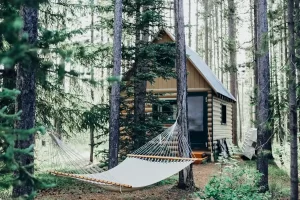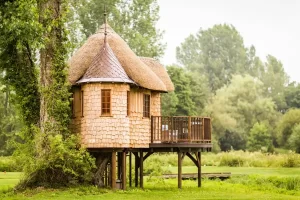As the world becomes increasingly aware of the environmental impact of human activities, the travel industry is undergoing a significant transformation. Sustainable travel, which emphasizes minimizing the negative effects of tourism on the environment and local communities, is more than just a buzzword—it’s a movement that’s reshaping how we explore the world.
Central to this shift is the concept of eco-friendly accommodations. These are places to stay that prioritize environmental conservation, social responsibility, and sustainability in their operations. From reducing waste and energy consumption to supporting local communities and preserving cultural heritage, these accommodations offer travelers a way to enjoy their journeys without leaving a heavy footprint.
The importance of choosing eco-friendly accommodations cannot be overstated. Traditional hotels and resorts often contribute to environmental degradation through high energy and water use, excessive waste generation, and disruption of local ecosystems. In contrast, eco-friendly accommodations aim to operate in harmony with their surroundings, offering a more mindful and responsible way to travel.
As sustainable tourism continues to grow in popularity, more travelers are seeking out these green alternatives. Whether it’s a rustic eco-lodge in the heart of the rainforest or a luxury resort committed to zero waste, the demand for accommodations that align with sustainable principles is on the rise. This blog explores some of the top eco-friendly accommodations around the globe, showcasing how you can sleep sustainably while experiencing the beauty and diversity of our planet.
What Makes an Accommodation Eco-Friendly?
Eco-friendly accommodations are more than just places to rest your head—they are thoughtfully designed and operated to minimize their impact on the environment while supporting local communities and economies. But what exactly makes an accommodation eco-friendly?
Definition and Key Features of Eco-Friendly Accommodations
Eco-friendly accommodations are lodgings that integrate sustainable practices into every aspect of their operation. This can range from using renewable energy sources and water-saving technologies to sourcing local and organic food for their restaurants and encouraging guests to participate in conservation efforts. Key features of these accommodations often include:
- Energy Efficiency: Use of solar panels, wind turbines, energy-efficient lighting, and appliances to reduce energy consumption.
- Water Conservation: Low-flow faucets and showerheads, rainwater harvesting systems, and wastewater recycling to minimize water usage.
- Waste Reduction: Programs for recycling, composting, and reducing single-use plastics, alongside efforts to minimize food waste.
- Sustainable Building Materials: Construction using locally sourced, recycled, or natural materials that reduce the carbon footprint.
- Support for Local Communities: Initiatives to employ local staff, use local products, and contribute to community development projects.
- Biodiversity and Habitat Conservation: Protection of natural areas, wildlife habitats, and ecosystems around the accommodation.
Certifications to Look For
To ensure that an accommodation genuinely adheres to eco-friendly practices, several certifications have been established globally. These certifications provide a standard that travelers can trust when choosing where to stay. Some of the most recognized certifications include:
- LEED (Leadership in Energy and Environmental Design): A globally recognized symbol of sustainability achievement, LEED certification assesses the environmental performance of buildings, focusing on energy savings, water efficiency, and CO2 emissions reduction.
- Green Key: An international eco-label awarded to hotels and other establishments that meet a strict set of environmental management criteria, covering areas like energy use, water conservation, and sustainable purchasing.
- EarthCheck: This certification focuses on sustainable tourism and provides a framework for environmental and social benchmarking, helping accommodations reduce their environmental footprint while supporting community well-being.
The Environmental, Social, and Economic Benefits
Staying at an eco-friendly accommodation offers a multitude of benefits that extend beyond personal satisfaction. Environmentally, these lodgings help reduce carbon emissions, conserve natural resources, and protect ecosystems. Socially, they often foster a deeper connection with local cultures and communities, promoting responsible tourism that respects and uplifts the places visited. Economically, eco-friendly accommodations can contribute to local economies by creating jobs, supporting local businesses, and reinvesting profits into community projects.
By choosing eco-friendly accommodations, travelers can enjoy their journeys with the peace of mind that comes from knowing they are supporting sustainable practices that benefit both the planet and its people.
Top Eco-Friendly Accommodations Around the Globe
Exploring the world sustainably means staying in places that prioritize the planet, its people, and the preservation of natural and cultural heritage. Here are some of the top eco-friendly accommodations around the globe, each offering unique sustainable practices and experiences.
North America
Fogo Island Inn, Canada
- Overview and Sustainable Practices: Situated on the rugged coast of Newfoundland, Fogo Island Inn is a shining example of sustainable luxury. The inn is designed with environmental conservation in mind, using locally sourced materials and employing renewable energy sources such as solar panels and wind turbines. The inn also features a state-of-the-art rainwater harvesting system and advanced waste management practices.
- Unique Features and Community Impact: Fogo Island Inn is deeply integrated with the local community, employing local artisans and craftsmen, and reinvesting profits into community development projects. Guests can immerse themselves in the island’s culture through hands-on experiences with local guides, ensuring a meaningful connection with the region’s heritage.
The Ranch at Rock Creek, USA
- Overview and Sustainable Practices: Nestled in the pristine wilderness of Montana, The Ranch at Rock Creek is a luxury eco-resort that combines rugged outdoor adventures with sustainable practices. The ranch utilizes geothermal heating, energy-efficient systems, and organic farming to minimize its environmental footprint.
- Unique Features and Community Impact: The Ranch actively supports wildlife conservation efforts and sustainable ranching practices, ensuring that the surrounding natural landscapes remain unspoiled. Guests can participate in conservation programs, such as habitat restoration and wildlife monitoring, making their stay both enjoyable and impactful.
South America
EcoCamp Patagonia, Chile
- Overview and Sustainable Practices: EcoCamp Patagonia, located in the heart of Torres del Paine National Park, is renowned for its low-impact, eco-friendly design. The camp’s geodesic domes are built with sustainable materials, and the entire facility operates on renewable energy sources, including solar and hydroelectric power.
- Unique Features and Biodiversity Conservation: EcoCamp is committed to preserving the pristine environment of Patagonia. The camp’s operations are carbon-neutral, and they actively engage in reforestation projects and wildlife conservation efforts. Guests are encouraged to participate in guided eco-tours, providing an in-depth understanding of the region’s unique ecosystems.
Inkaterra Machu Picchu Pueblo Hotel, Peru
- Overview and Sustainable Practices: Set amidst lush cloud forests near Machu Picchu, Inkaterra Machu Picchu Pueblo Hotel is a pioneer in eco-friendly hospitality in Peru. The hotel utilizes sustainable construction techniques, energy-efficient systems, and organic gardens to reduce its environmental impact.
- Unique Features and Biodiversity Conservation: Inkaterra is heavily involved in biodiversity research and conservation, particularly in protecting the region’s diverse flora and fauna. The hotel offers guided nature walks, bird-watching tours, and educational programs, allowing guests to contribute to conservation efforts while enjoying the natural beauty of the Andes.
Europe
Ecolodge des Chartrons, France
- Overview and Sustainable Practices: Located in the historic city of Bordeaux, Ecolodge des Chartrons is a charming boutique hotel that combines urban sophistication with sustainable living. The hotel features energy-efficient lighting, solar panels, and a commitment to reducing waste through recycling and composting.
- Historical Preservation and Green Technology Integration: The building itself is a restored 18th-century townhouse, preserving the historical architecture while incorporating modern green technologies. Guests can explore the rich cultural heritage of Bordeaux while staying in an eco-friendly setting that honors both the past and the future.
Whitepod Eco-Luxury Hotel, Switzerland
- Overview and Sustainable Practices: Whitepod is a unique eco-luxury hotel located in the Swiss Alps, offering a blend of adventure and sustainability. The hotel’s pods are designed to minimize environmental impact, featuring energy-efficient heating, water-saving technologies, and a commitment to sourcing local, organic food.
- Unique Features and Community Impact: Whitepod actively contributes to local environmental conservation efforts, including reforestation and wildlife protection. The hotel also supports the local economy by employing residents and promoting regional products, ensuring that guests’ stays benefit the surrounding community.
Africa
Sossusvlei Desert Lodge, Namibia
- Overview and Sustainable Practices: Sossusvlei Desert Lodge is a luxury eco-lodge set in the vast Namib Desert, designed to blend seamlessly with the natural environment. The lodge is powered by solar energy, and water conservation is a top priority in this arid landscape.
- Connection with Local Communities and Wildlife Protection: The lodge is deeply committed to preserving the desert ecosystem and supporting local communities. They partner with conservation organizations to protect endangered species and offer educational programs for guests to learn about the unique desert environment and the challenges it faces.
Campi ya Kanzi, Kenya
- Overview and Sustainable Practices: Situated in the Chyulu Hills of Kenya, Campi ya Kanzi is an award-winning eco-lodge that exemplifies sustainable tourism in Africa. The camp operates entirely on solar power, and water is carefully conserved through rainwater harvesting and graywater recycling.
- Unique Features and Wildlife Protection: Campi ya Kanzi is renowned for its partnership with the local Maasai community, promoting cultural preservation and wildlife conservation. Guests can participate in safaris led by Maasai guides, providing a unique cultural experience while supporting conservation efforts that protect Africa’s iconic wildlife.
Asia
Six Senses Ninh Van Bay, Vietnam
- Overview and Sustainable Practices: Nestled in a secluded bay in Vietnam, Six Senses Ninh Van Bay offers luxury accommodations with a strong commitment to sustainability. The resort uses solar energy, organic gardens, and a zero-waste policy to minimize its environmental impact.
- Cultural Sensitivity and Eco-Tourism Focus: The resort places a strong emphasis on cultural sensitivity, offering guests authentic experiences that respect local traditions and support the surrounding communities. Guests can engage in eco-tours that highlight the region’s natural beauty while learning about sustainable practices in local villages.
Soneva Fushi, Maldives
- Overview and Sustainable Practices: Soneva Fushi, located on a private island in the Maldives, is a leading example of sustainable luxury in Asia. The resort is powered by solar energy, has a comprehensive waste management system, and operates under a strict zero-plastic policy.
- Unique Features and Community Impact: Soneva Fushi actively supports marine conservation initiatives and is involved in coral reef restoration projects. The resort also invests in local education and healthcare, ensuring that the benefits of tourism extend to the island’s residents.
Oceania
Longitude 131°, Australia
- Overview and Sustainable Practices: Overlooking the iconic Uluru in Australia, Longitude 131° is an eco-friendly luxury camp that emphasizes sustainable living. The camp is powered by solar energy, and strict waste and water management practices are in place to protect the fragile desert environment.
- Marine Conservation and Low-Impact Tourism: The camp’s commitment to sustainability extends to its partnerships with local Indigenous communities, offering guests culturally immersive experiences while ensuring that tourism supports the preservation of Aboriginal heritage.
The Brando, French Polynesia
- Overview and Sustainable Practices: The Brando is a world-renowned eco-resort located on Tetiaroa, a private island in French Polynesia. The resort operates with a near-zero carbon footprint, using solar power, seawater air-conditioning, and a biodiesel plant.
- Unique Features and Low-Impact Tourism: The Brando is deeply involved in marine conservation, with efforts to protect the surrounding coral reefs and marine life. The resort also funds scientific research on climate change and its impacts on the Pacific Islands, allowing guests to engage in educational experiences that highlight the importance of preserving these fragile ecosystems.
How to Choose the Right Eco-Friendly Accommodation
With the growing popularity of sustainable travel, many accommodations now claim to be eco-friendly. However, not all of them live up to their promises. To ensure your stay is genuinely sustainable, it’s important to know how to choose the right eco-friendly accommodation. Here are some tips to help you make informed decisions.
Tips for Researching and Verifying Sustainability Claims
- Look for Certifications: One of the easiest ways to verify an accommodation’s sustainability is by checking for recognized certifications. Look for eco-labels such as LEED, Green Key, EarthCheck, or similar, which indicate that the property meets established environmental standards. These certifications require rigorous assessments, ensuring that the accommodation adheres to genuine sustainable practices.
- Read Reviews and Testimonials: Guest reviews can provide valuable insights into the authenticity of an accommodation’s sustainability claims. Look for reviews that mention specific eco-friendly practices, such as energy efficiency, waste reduction, and community involvement. Travel forums and websites like TripAdvisor often feature discussions on the credibility of sustainability claims.
- Check the Accommodation’s Website: A truly eco-friendly accommodation will usually be transparent about its practices. Visit the property’s website to see if they provide detailed information about their sustainability efforts. Look for specifics, such as renewable energy usage, water conservation measures, waste management systems, and community support initiatives.
- Ask Questions Directly: Don’t hesitate to contact the accommodation directly to ask about their sustainability practices. Inquire about their energy sources, waste disposal methods, and how they engage with the local community. The willingness to provide detailed answers often reflects their commitment to sustainability.
Balancing Comfort and Sustainability
Choosing an eco-friendly accommodation doesn’t mean you have to compromise on comfort. Many sustainable lodgings offer luxurious experiences while minimizing their environmental impact. Here’s how to strike the right balance:
- Prioritize Essential Comforts: Decide which amenities are non-negotiable for your stay, such as comfortable bedding, good food, and reliable Wi-Fi. Many eco-friendly accommodations offer these essentials while maintaining sustainable practices.
- Consider Eco-Luxury Options: If comfort is a priority, look for eco-luxury accommodations that blend sustainability with high-end amenities. These properties often use renewable energy, organic materials, and locally sourced food while offering luxurious accommodations and services.
- Be Open to Unique Experiences: Some eco-friendly accommodations may offer unique, nature-based experiences that differ from traditional hotels. For example, staying in an off-grid cabin or a solar-powered yurt can provide a memorable and comfortable stay while immersing you in nature.
Considerations for Supporting Local Communities
Supporting local communities is a key aspect of sustainable travel. When choosing an eco-friendly accommodation, consider how your stay can positively impact the local area:
- Choose Locally Owned Accommodations: Opt for lodgings that are locally owned and operated. This ensures that more of your money stays within the community, supporting local businesses and livelihoods.
- Look for Community Engagement: Some eco-friendly accommodations actively support local communities through various initiatives, such as employing local staff, sourcing local products, and funding community projects. Choose properties that demonstrate a commitment to social responsibility.
- Respect Local Cultures and Traditions: Stay at accommodations that promote cultural sensitivity and encourage guests to learn about and respect local traditions. This not only enriches your travel experience but also helps preserve cultural heritage.
- Participate in Community-Based Tourism: Some accommodations offer opportunities for guests to engage with local communities through guided tours, workshops, and volunteer programs. These experiences allow you to contribute positively to the community while gaining a deeper understanding of the local culture.
By carefully researching and selecting eco-friendly accommodations, you can enjoy a comfortable, enriching travel experience while minimizing your environmental impact and supporting the communities you visit.
Conclusion
As we journey through an increasingly interconnected world, the choices we make as travelers have a profound impact on the environment and the communities we visit. Choosing eco-friendly accommodations is not just a trend—it’s a crucial step towards more responsible and sustainable travel. By opting for lodgings that prioritize environmental conservation, resource efficiency, and community well-being, you contribute to the preservation of our planet’s natural and cultural treasures.
Sustainable travel is about more than just reducing your carbon footprint; it’s about enriching your travel experiences in ways that are mindful of the world around you. Whether it’s a secluded eco-lodge in the heart of the jungle or a luxury resort committed to zero waste, the options for sustainable accommodations are diverse and growing. Each choice you make has the potential to support conservation efforts, uplift local economies, and foster deeper connections with the places and people you encounter.
We encourage you to prioritize sustainability in your travel plans. The next time you book a trip, take the extra step to research and choose accommodations that align with your values. Not only will you be ensuring a more responsible journey, but you’ll also be paving the way for future travelers to enjoy the same natural beauty and cultural richness that you do.
Finally, we’d love to hear from you! If you’ve stayed at an eco-friendly accommodation, share your experience with us. What stood out to you? How did it enhance your trip? By sharing your stories, you can inspire others to embrace sustainable travel and help us all contribute to a healthier, more vibrant world.




